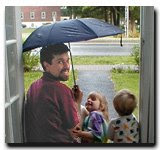When starting seeds, use 1 part finished compost or worm castings to 3 parts potting mix to give your little plants a healthy head start without synthetic fertilizers.
- It's easy to make your own compost or worm castings from kitchen scraps.
- When micro-organisms decompose organic matter, the result is called "compost". Finished compost is dark brown or black, crumbly, and has a mild organic aroma like mushrooms.
- When worms process organic matter, the result is called "castings". Castings look like wet coffee grounds and smell like healthy soil.
- Both compost and castings provide essential nutrients for growing plants.
- Most families can produce enough compost or castings to provide a rich mix for starting their seeds.
- You'll need to add some dry materials like shredded paper, leaves, or clean sawdust to your kitchen scraps. Adding these materials helps the decomposing process go faster without nasty odors.
- A plug-in kitchen composter like the NatureMill reliably produces compost in two weeks by maintaining the perfect conditions for hot composting by microbial cultures. The compost it produces is ready to use right away, or can be stored for later use.
- Worm bins generally take a little longer to produce results--about six weeks start to finish--depending on temperature, the type of food scraps, and the appetite of your worms. Worm castings can be used as is, but if you plan to store them for later use, you'll probably want to dry them first.
- Worms like the same temperatures as we do, but will tolerate cool temperatures down to the mid-50s and high temperatures into the mid-80s. They work best in the low-70s.
- If you put a worm bin in your basement, use a portable thermometer to determine the temperature range. Near the boiler is often a convenient and relatively warm location.
- Keeping your kitchen scraps out of your garbage benefits you and your community; neither landfills nor incinerators need wet organic waste.
- Whether you make compost or castings, most of your kitchen waste will literally vanish into thin air as the process creates water vapor and carbon dioxide.
- Compost and castings improve the texture and health of soil, helping it retain moisture while allowing roots to penetrate.
- Recycling organic nutrients back into the soil completes the cycle of life and allows new plant growth to occur without requiring exogenous synthetic chemical inputs.
- Building healthy soil with compost and castings is an essential part of successful organic gardening.
- Besides mixing compost or castings in your seed-starting medium, you can also use them as a top dressing periodically in your garden, around trees, or on your lawn.
- A kitchen compost pail makes it easy to collect scraps. A tight-fitting lid with a charcoal filter controls odors and keeps everything contained until you're ready to add it to your composter or worm bin.
- It's fine to toss your kitchen scraps in an outdoor compost pile all winter. They won't start composting outdoors until warmer temperature arrives, but there's no harm in letting your food waste freeze and thaw before it turns into compost.
- Some people even store their kitchen waste in their freezer until spring. This isn't as crazy as it sounds. It actually helps your freezer's efficiency to be full rather than empty, and if you ever lose power, hunks of frozen garbage can keep your food cool. Just make sure you label everything carefully!
- Composting equipment, information and supplies, including worms and worm bins, are available year round at F.W. Horch in Brunswick and online at www.FWHorch.com.

